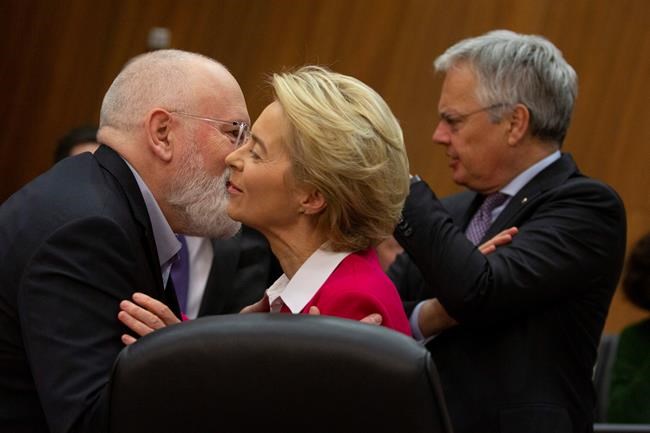EU promises to try to save Iran nuclear deal despite setback
Advertisement
Read this article for free:
or
Already have an account? Log in here »
To continue reading, please subscribe:
Monthly Digital Subscription
$0 for the first 4 weeks*
- Enjoy unlimited reading on winnipegfreepress.com
- Read the E-Edition, our digital replica newspaper
- Access News Break, our award-winning app
- Play interactive puzzles
*No charge for 4 weeks then price increases to the regular rate of $19.00 plus GST every four weeks. Offer available to new and qualified returning subscribers only. Cancel any time.
Monthly Digital Subscription
$4.75/week*
- Enjoy unlimited reading on winnipegfreepress.com
- Read the E-Edition, our digital replica newspaper
- Access News Break, our award-winning app
- Play interactive puzzles
*Billed as $19 plus GST every four weeks. Cancel any time.
To continue reading, please subscribe:
Add Free Press access to your Brandon Sun subscription for only an additional
$1 for the first 4 weeks*
*Your next subscription payment will increase by $1.00 and you will be charged $16.99 plus GST for four weeks. After four weeks, your payment will increase to $23.99 plus GST every four weeks.
Read unlimited articles for free today:
or
Already have an account? Log in here »
Hey there, time traveller!
This article was published 08/01/2020 (2167 days ago), so information in it may no longer be current.
BRUSSELS – The European Union said Wednesday it “will spare no efforts” in its attempts to keep alive an international deal preventing Iran from developing atomic weapons.
EU Commission President Ursula von der Leyen said her foreign affairs chief Josep Borrell will continue to work “in the midterm” to reach out to all participants in the global deal in the hopes that the 2015 nuclear agreement can still be saved despite a rollback on commitments from Tehran.
Von der Leyen also reiterated the need to de-escalate the tension in the region, especially after Iran’s missile attack on two American bases in response to a U.S. strike that killed its top general.

“The use of weapons must stop now to give space for dialogue,” she said. “We are called upon to do everything possible to rekindle talks. There cannot be enough of that.”
Speaking alongside von der Leyen, Borrell urged all parties involved in the growing tensions to eschew more military action.
“The latest rocket attack on airbases in Iraq used by U.S. and coalition forces, among them European forces, is yet another example of escalation and increased confrontation. It is in no one’s interest to turn up the spiral of violence even further,” he said.
Borrell has invited Iranian Foreign Minister Javad Zarif to Brussels for talks, but a date for his visit has yet to be set amid a frenzy of diplomatic activities. The EU foreign ministers have organized a special meeting on Friday to discuss the ongoing crisis.
Iran struck the nuclear deal in 2015 with the United States, France, Germany, the United Kingdom, Russia and China. The deal, formally known as the Joint Comprehensive Plan of Action, has however been on life support since U.S. President Donald Trump unilaterally abandoned it in 2018, triggering sanctions that have hurt Iran’s struggling economy. Since then, Tehran has gradually rolled back its commitment to the deal.
Borrell said the Iran nuclear deal is “today more important than ever because this is the only place where we can sit together with the Russians and Chinese to talk on a multilateral basis about the many risks that we are facing. It’s one of the most important tools of nonproliferation and regional security.”
After its top general was assassinated in the U.S. drone attack, Iran announced over the weekend that it would no longer respect limits set on how many centrifuges it can use to enrich uranium.
Zarif said the move was a “remedial step” taken within the framework of the nuclear deal and he said it could be reversed.


